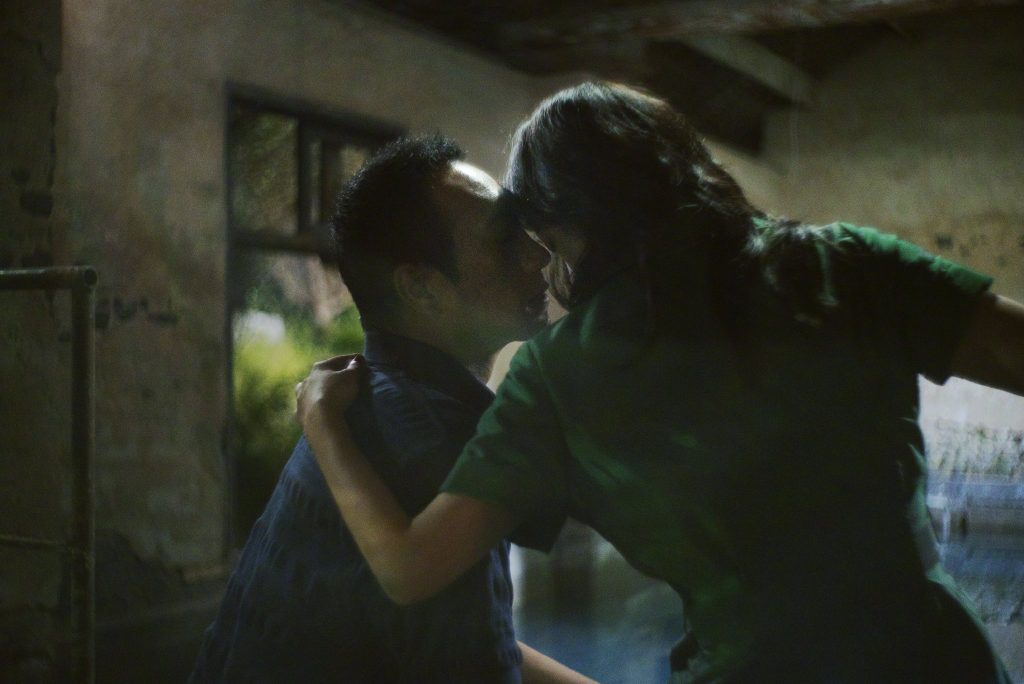Long Day’s Journey into Night, a Chinese drama film and last year’s film festival favorite by director Bi Gan, will open this Friday (April 12) in New York City at Film Society of Lincoln Center and Metrograph. Last year, at the film’s NYFF premiere, CFI spoke with director Bi Gan and lead actor Huang Jue on the making of the film, the creative environment in China, and more.
The scenes in the movie are almost dreamlike. Why did you decide to give it such a feel?
Bi: I think all artists try to create something dreamlike, and have the interest in these kind of aspects.
Huang: I think all of us are prisoners of reality. Dreams are windows that lead us to where we want to be, whatever dream it may be. Our artistic productions and realities are all reflections of our innermost selves.
To Huang: Why did you join in on this project?
Huang: I saw the film Kaili Blues, and found out about this director named Bi Gan. I then began to tell everybody I want to collaborate with him. Then when he met me, he thought I was ok, so we started working together.
The movie is a combination of many genres and styles, it’s like a gangster film, but is also a love story, it also has traces of film noir. Was it planned during production to mix different genres together?
Bi: We don’t think about these things during the creative process. Only when the film is completed, people, (for example) the media, or friends will mention things like this. People only define movies in so many ways, that’s how they end up labeling them with genres.
Can you tell us about the music in the film? Taiwanese singer Wubai’s “Reasons to be Strong” was featured in the film, then at the end of the film we hear a Japanese song. What was your inspiration behind the choice of music?
Bi: To choose music that sounds good. I have a music library, whenever I make a movie, I select songs from it.
Within the past two years, the Chinese film industry has developed rapidly, box office has surged, China may well become the biggest film market. Has there been a change in environment for independent or art house filmmakers? How do you feel about the rapid development of the industry?
Bi: I can’t determine this at the moment. Maybe in ten or twenty years I could make a better judgment on this. These years, I’ve been busy making movies. I don’t know if the market has changed for the better, allowing more companies to focus on younger directors; or is it due to technological development, which makes it easier to access filming devices. It could be a number of reasons. The creative environment hasn’t changed for me personally. If the market isn’t healthy, or I have to make a movie with film, it doesn’t affect me. There are many ways to tell a story, ways other than mine. It’s just that right now, there are better opportunities to use more industrialized ways to portray art.
Huang: I’ve been in this industry for a longer time (chuckle). I think the environment is getting better. Though only when the industrialization becomes more mature, then can different perspectives be noticed. For example, ten years ago I couldn’t make a film like this. The industry is maturing, young directors and unique stories have more opportunities to shine. I believe that commercialism is a protection.
There was news about arthouse director Chloe Zhao directing an upcoming superhero film for Marvel. If Marvel were to approach you for a collaboration, would you consider?
Bi: Marvel wouldn’t come to me. (follow up question: hypothetically speaking) I’m open minded and can make different kinds of films.
Huang: I think he would because he is a curious person. As long as he’s comfortable doing it and is clear as to what he’s perusing, I think he would do it.
What if they wanted you to play a role of a superhero?
Huang: I don’t think I would. I don’t look like a super hero, I’d decline. For Bi, superhero movies are a novelty, are something fun and different, like 3D technology, so he may want to give it a try. I’d probably decline…(in terms of acting in these kinds of movies).
Two of your previous films were all shot in Kaili in Guizhou Province. Will you consider filming elsewhere for future projects? If you were to shoot a film in New York, what kind of a story would you think be suitable to happen there?
Bi: I may shoot anywhere. I even want to shoot on the moon. Location is not a problem these days. I don’t necessarily have to shoot in Kaili. If I were to shoot a film in New York…it may be a story about eating.
Huang: I really like this small budget film from a couple years ago. Its budget is probably smaller than Kaili Blues. The film is called Take Out. It’s about an illegal immigrant delivery guy working in Chinatown. A lot of people dislike New York’s Chinatown, but I really like it. (CFI: Why?) Because it has the China that China doesn’t have anymore.
Bi: New York’s Chinatown is frozen in time, like a screenshot of history. Not like the ever developing China where everything is always changing. Chinatown can’t change and doesn’t need to. It just needs to stay as it is. That’s why it attracts me.
Would you (Huang) want to make a movie or write a story in the future?
Huang: I don’t want to…
Bi: I’ve been encouraging him.
Huang: I don’t have that particular skill set.
Bi: I think he would be a pretty good director. Maybe our next film will be him filming me, I’d be a Mexican drug lord.
Huang: I think you’d end our relationship within two days of filming. I have a bad temper.
Bi: I have a good temper. I’m very Cali. He’s very Brooklyn.
Huang: I’m an activist from Brooklyn, he’s a surfer from California.
We all really like the ropeway scene in “Long Day’s Journey Into Night.” Can you share your ideas behind it?
Huang: The ropeway scene came to be due to a difficulty at the shooting location. For example, you’d have to go around and around the mountain many times to get from the top to the bottom of it. So what’s an alternative solution? A ropeway would be the most efficient way to go. Therefore, the director decided to install a ropeway. But we don’t have a budget for that, now what? The money we used to install the ropeway was from the director‘s salary.
Bi: But I got my hundred thousand back. (laugh)
Do you have any future plans?
Bi: I’ll be resting and creating (my next film).
Is there some correlation between your poem and movie?
Bi: Like I’ve mentioned before, a poem is like enjoying karaoke by yourself, a movie is like a bunch of people going to KTV together.
–This interview was conducted in mandarin and translated into English by Audrey Siegel.







